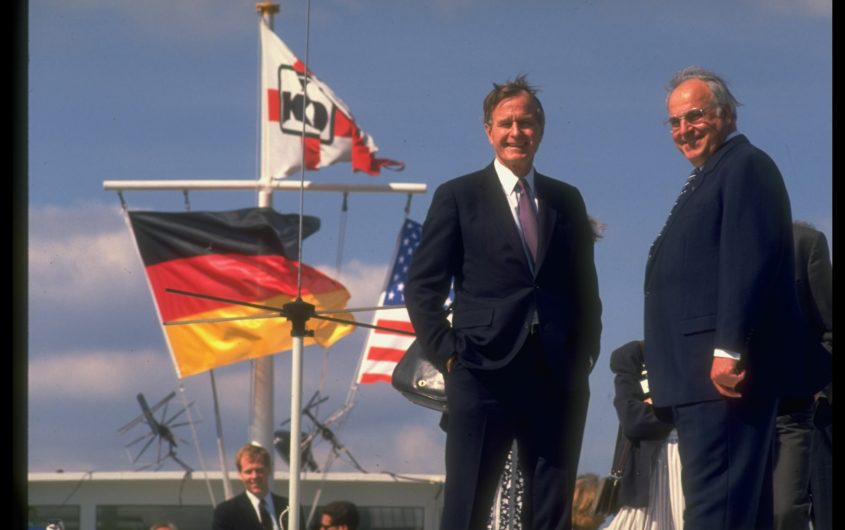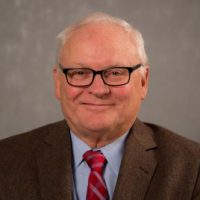
Dirck Halstead/The LIFE Images Collection/Getty Images
Remembering George H. W. Bush and Germany: A True Partner in Leadership

Stephen F. Szabo
Senior Fellow
Dr. Stephen F. Szabo is a Senior Fellow at AICGS, where he focuses on German foreign and security policies and the new German role in Europe and beyond. Until 2017, he was the Executive Director of the Transatlantic Academy, a Washington, DC, based forum for research and dialogue between scholars, policy experts, and authors from both sides of the Atlantic. Prior to joining the German Marshall Fund in 2007, Dr. Szabo was Interim Dean and Associate Dean for Academic Affairs and taught European Studies at The Paul H. Nitze School of Advanced International Studies, Johns Hopkins University. He served as Professor of National Security Affairs at the National War College, National Defense University (1982-1990). He received his PhD in Political Science from Georgetown University and has been a fellow with the Alexander von Humboldt Stiftung, the Woodrow Wilson International Center for Scholars, and the American Academy in Berlin, as well as serving as Research Director at AICGS. In addition to SAIS, he has taught at the Hertie School of Governance, Georgetown University, George Washington University, and the University of Virginia. He has published widely on European and German politics and foreign policies, including. The Successor Generation: International Perspectives of Postwar Europeans, The Diplomacy of German Unification, Parting Ways: The Crisis in the German-American Relationship, and Germany, Russia and the Rise of Geo-Economics.
The death of former president George H. W. Bush will be mourned in Germany as well as in his home country. He was, along with Harry Truman, the most consequential American leader in the German-American relationship since the end of World War II, which means in the entire history of the relations with the Federal Republic of Germany. The Truman administration helped to constitute and consolidate the West German state while Bush 41 helped it to find a peaceful end to its national division without destabilizing Europe. As President Bush noted in his address to the German people the day before Germany was officially reunified in October 1990,
The United States is proud to have built with you the foundations of freedom; proud to have been a steady partner in the quest for one Germany, whole and free. America is proud to count itself among the friends and allies of free Germany, now and in the future. Our peoples are united by the common bonds of culture, by a shared heritage in history. Never before have these common bonds been more evident than in this past year as we worked in common cause toward the goal of German unity. Today, together, we share the fruits of our friendship.
President Bush and his team produced the greatest success in American diplomacy since the Marshall Plan and the founding of NATO. This was due to his measured and realistic approach to diplomacy but also to his choice of his supporting team, most notably Secretary of State James Baker and National Security Advisor Brent Scowcroft at the senior level as well as a great bench in Washington including Robert Zoellick, Dennis Ross, Condoleezza Rice, and others. But it all began at the top with the man who had to make the key decisions and close the major deals. Most notable was President Bush’s early endorsement of the peaceful path to German unification which came as early as November 1989, just after the fall of the Berlin Wall. This came at a time when Margaret Thatcher and François Mitterrand were looking for ways to slow the move toward German unity and Gorbachev was not thinking in terms of German unification. Bush’s close relationship with Chancellor Kohl and the close coordination and cooperation between Team Bush and the Germans, including Hans-Dietrich Genscher and Horst Teltschik, was key to the successful management of this crucial diplomatic process. This was also the case in regard to the way they dealt with a beleaguered Soviet president, Mikhail Gorbachev, and his foreign minister, Eduard Shevardnadze.
The diplomacy of German unification was a case of a very small number of key players, less than twenty people overall in these three key countries, who managed a revolution set off by millions in East Germany, Poland, and across Central Europe and reached a settlement without major violence. President Bush not only reassured Kohl and was behind him throughout the eventful year set off by the fall of the Wall, but he also was able to convince Gorbachev that a united Germany within NATO was in the Russian interest as well. He had the character and wisdom not to try to be the dominant figure but to allow Germans to take the lead and the credit. He also overrode a reluctant and obstructionist Margaret Thatcher. Rather than leading from behind, he led from within.
As the former British Conservative politician and rabble rouser Enoch Powell once wrote, “All political lives, unless they are cut off in midstream at a happy juncture, end in failure, because that is the nature of politics and of human affairs.” The obituaries for the late president, while crediting him for guiding the U.S. and Europe through this historic period, have emphasized his domestic weakness and inability to connect to the larger American public that made him a one-term president. While this may be true, his contributions both to America’s role in the world and to the larger global order will overshadow his domestic failings. He and his able team will be remembered as successes by history for what they accomplished. Their foreign policy achievements stand in contrast to the failures that followed, including those of his son. At this time of great strains in the German-American relationship, it is good to keep in mind what the two countries can accomplish together.
Stephen F. Szabo is the author of The Diplomacy of German Unification.









